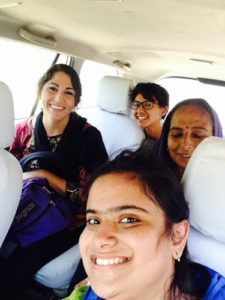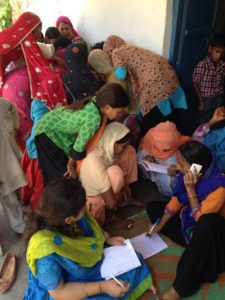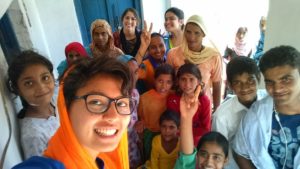Eid Mubarak from your favorite LSE team! Since tomorrow is the Islamic holiday known as Eid al-Fitr, the celebration of the end of Ramadan and the first day of the Islamic month of Shawwal, we are not in the office today! The beautiful Zara has gone home to celebrate with her family, and Soumya and I have quarantined ourselves for the day due to an unpleasant cold. What better time for me to remember forgetting to post this on Sunday?

Now that we have been here for over two weeks, Soumya and I have adapted, becoming near experts at metro navigation, not dying from dehydration, and bargaining for basically anything we have to purchase! (Okay well maybe not expert bargainers, we’re actually probably still paying double for everything, but let’s pretend.) Before getting into how work went this week, I would first like to expand a little on the cultural aspect of working and living in India as Americans, as that is a huge part of this whole experience. I must preface this by saying while I aim to keep these observations as objective as possible, I am not one to sugar coat, and will be 100% honest about my feelings on these topics.
For starters, being a white woman in India has proved to be quite the double-edged sword. Random staff at monuments will just offer to give you tours, gentlemen will give up their seat for you on the metro, and cab drivers swarm to you offering a ride the second you get off the metro (but only for an undoubtedly inflated price). The caste system here has basically engrained in everyone’s mind that white people are rich. Though it seems fair-skinned people are few and far between here, you will find the majority of advertisements depicting white people using their products. This is done to insinuate the people who buy these products are both educated and have money. But this perceived notion also means everywhere you go, you feel as though you’re on display. Even as someone who has never been one to shy away from a spotlight, I was thrown off by the stares for at least the first week we were here. People will do a double take when they see me on the street, nudge their friends and point me out, and anyone that has something to sell is trying to sell it to me. If you don’t have any idea about what prices should be like for cab rides or items in a bazaar, you’re a white girl in trouble, because they will charge you four times what something is worth. But, I digress, as Soumya and I are both tough cookies and have been getting better at dealing with this.
India is what I would call a beautiful disaster. There are tons of historic sites with grand architecture dating back thousands of years, awe-inspiring temples and mosques, gardens and exotic wildlife, and truly the most welcoming people I’ve ever met, all dressed in the most beautiful patterns and vibrant colors I’ve ever seen. There is also a large number of people living in extreme poverty quite literally in the streets, a serious problem with open defecation, trash piled along the roads, and streams so polluted the water has turned black. Cows, pigs, goats, stray dogs, and even a camel or two can be found walking right down the middle of the street, even in a business district like Gurgaon, where we live. We truly are in the land of extremes, and to be honest, I could not be more grateful. When you live in the U.S. and grow up in an average middle-class household, you hear about the impoverished, you hear about the various problems people of other countries deal with, but I don’t think anyone truly understands what life could be like for those people until you have seen it first hand. I felt ashamed the day I realized I’ve been taking something as seemingly basic as having regular access to clean drinking water for granted my entire life. I can be the opinionated, independent young woman I am, and I can do it wearing shorts and a tank top. I can walk around at night after 9pm without seriously worrying something might happen to me, and I most definitely did not disappoint by family by not getting married when I turned 18. Many women in India cannot say the same, which brings me to how work went this week, starting with Tuesday’s visit to the village of Rawli.
We spent three days of last week in both Rawli and Mundaka getting the girls registered for our program and completing their pre-program tests. Something that sounds like it would be relatively quick to do turned out to be the opposite. On Tuesday when we arrived in Rawli, we discovered the girls would not all be meeting us in one place, which meant we had to walk door to door all over the village, in 100+ degree weather, individually signing each person up. As is the norm in Rawli, we collected a small parade of curious children who followed us around for the day, who remained virtually silent, but kept their eyes on us and giggled each time Soumya or I tried to directly interact with them. Because Rawli is our more traditional, Muslim village, I wondered if the stares coming from the men sitting on porches were curious or displeased with our presence, and even now I still don’t have a conclusion on that. We did, however, come face to face with misogyny on this day. We were seated in a house while Urmila, our fabulous field staff worker and the strongest woman I have ever met, was explaining the program to a few women. One woman’s husband came in and started arguing with Urmila, saying women didn’t need the economic independence that could come from learning how to sew, that they do not need to leave the house or village, and that his wife cannot even drink water without his permission and would not be signing up for our program. Even after Urmila ceased to protest, he followed us into the street with unnecessary personal attacks, asking Urmila if her husband didn’t make enough money and why she was there, going door to door, doing this work. Urmila did briefly speak to this man’s wife, who said that she felt she was free in her home. Even as the words came out of her mouth, I wonder if she believed them at all. We ended up spending four hours in Rawli recruiting girls, as we had to do more convincing at some houses than others. Some girls didn’t see the point in taking a four month course when they could just learn how to sew in one. I left Rawli that day feeling sad and a little worried about the male influence in the village, and wondering if the repression would keep these girls from ever opening up to us; Thursday put those worries to rest. In one big gathering of all enrolled girls, Zara, Soumya, Urmila, and I helped each of them complete their pre-test. Between Soumya and I picking up a few phrases in Hindi and a few of the girls knowing some in English, communicating wasn’t as difficult as I’d expected. We finally started to bond with the girls of Rawli, and all it took was an iPhone. While snapping a pic (see below) of Zara and Urmila doing questionnaires, a few of the girls sitting near me asked to see pictures of my family and friends back in the U.S, and a photo frenzy was born. Soon everyone was asking Soumya and I to show and take pictures of them and with them. Something about seeing where we come from and who the important people in our lives are seemed to make it easier for them to relate to us. I guess some things really are universal, and a cute photo op with your favorite girls is one of them. We left Rawli that day with a few great pictures and full hearts, finally feeling connected with the girls, and excited to come back.
We spent the second half of Thursday and Friday in Mundaka doing registrations and questionnaires, and fortunately did not have to go door to door, nor did we have to do as much convincing. In general, Mundaka has a much more communal and laid back vibe than Rawli. Their houses are close together and open, and it is normal for neighbors to sit around together in groups with a family- like atmosphere. Both days we were there, we collected a large gathering of women, children, and even a few men who sat all around us as we completed registration. I was pleasantly surprised by the men who were not only welcoming and interacting with us, but how supportive a few of them were. We visited one house to register two girls, and one of them was too shy and did not want to speak to Urmila to sign up. Two of the men sitting with us tried to convince her and even told her it was important to learn. Though she could not be convinced, this interaction hinted to Soumya, Zara, and I that the program will likely get a quick and easy start up in the following weeks.
We will not be in the field during week three due to the holiday, but are in the mean time editing curriculum materials and running data analysis on the completed pre-tests. This LSE train is full steam ahead and we are looking forward to officially opening up our two centers soon. Thanks for reading this accidental short novel and stay tuned for our update at the end of this week- the half way mark of our time here!!


